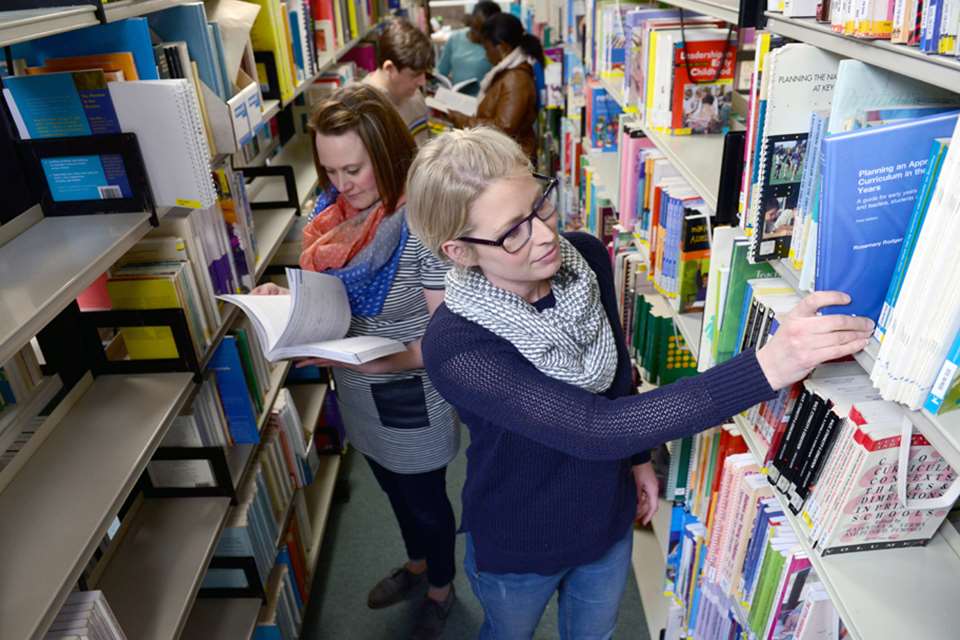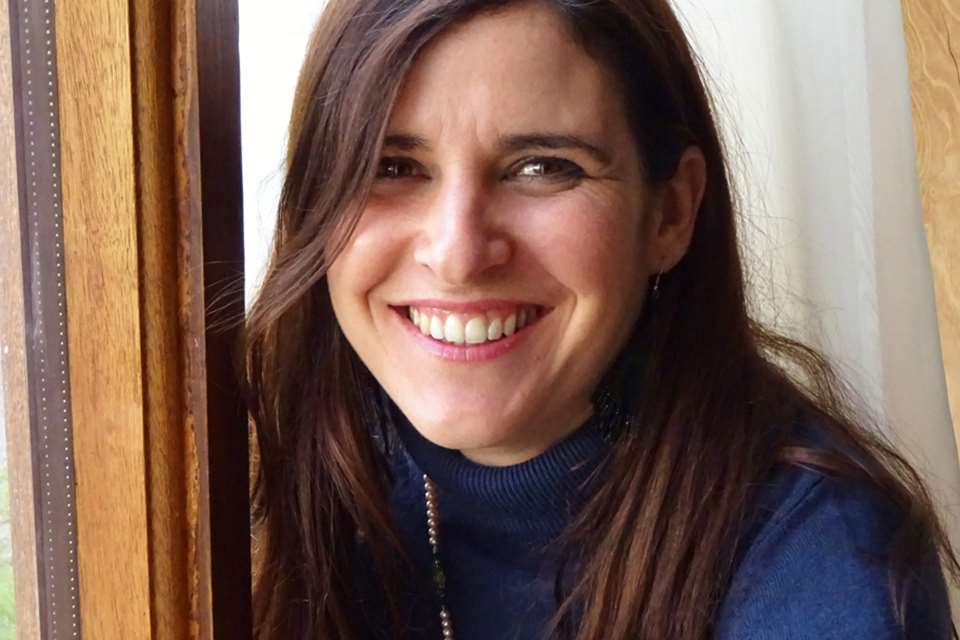Early Years Teachers: Part 3 - Joined-up learning
Charlotte Goddard
Monday, June 1, 2015
In her third article on Early Years Teacher training options, Charlotte Goddard finds out how one aspiring practitioner is combining the qualification with her undergraduate degree

As the warm weather arrives, third-year degree students all over the country have their sights fir- mly fixed on graduation. Jess Harrison, 21, is coming to the end of her BA Honours in Early Childhood Studies, but unlike most of the other students on her course she will leave with Early Years Teacher Status (EYTS) to her name.
'When I was younger my Dad was away with the navy a lot so I helped my Mum look after my little sister,' she says. 'I went to a boarding school, and became like a big sister to a lot of the younger children. I was just drawn to working with and looking after young children.'
After school Ms Harrison went to college and earned a BTEC National Diploma Level 3 in Children's Care, Learning and Development. She took a full-time position at McDonald's to support herself while she was looking for a job in childcare, but then decided instead to further her learning with a degree. Finding the prospect of student halls unattractive after moving into her own place, she chose her local university, Portsmouth, so she could live at home.
 'In the second year (of the degree) we were informed about EYTS and I thought it would be a good way to take things forward,' she says. 'You replace a unit in the third year with Early Years Initial Teacher Training (EYITT), and it also counts towards your degree.'
'In the second year (of the degree) we were informed about EYTS and I thought it would be a good way to take things forward,' she says. 'You replace a unit in the third year with Early Years Initial Teacher Training (EYITT), and it also counts towards your degree.'
Only one or two others in Ms Harrison's cohort of 40 or 50 students decided to take this route. Some wanted to go on to do a primary education PGCE so they could teach in primary schools. Others stumbled on the skills tests that applicants for EYTS have to pass. 'Personally I found the skills tests OK, but suddenly having to do maths again after having left school behind me was a bit of a shock,' says Ms Harrison.
Another challenge was gaining the 120 hours of early years experience required to earn EYTS, while also undergoing the rigours of a degree course. But Ms Harrison was already working shifts as bank staff for local chain Tops Day Nurseries, and was able to count that work towards her 120 hours. 'I was OK as I had built up a large number of hours, but others found it stressful,' she says.
Kasia Stunt, manager at Tops Day Nurseries' Portsmouth setting, is keen to help Ms Harrison gain as many hours' experience as she can. 'We always find space for her,' she says. 'I believe people who are highly educated are an asset to the nursery, and can bring in the changes and new ideas that the sector needs. Jess has shown a lot of knowledge about children's development across all age groups, and she is a great role model to the Level 2 and Level 3 qualified practitioners.' The nursery recently gained an outstanding rating from Ofsted, and Ms Harrison was involved in the inspection process.
Sarah Barton, senior lecturer at the University of Portsmouth's School of Education and Continuing Studies, says: 'Most of the EYTS work happens in the third year. We incorporate the huge number of days the Government expects students to cover by also utilising the second year, giving students several different opportunities through assessed units to go into placements and gather experience.
'In the summer holidays we encourage students to gather as much evidence as they can through work and volunteering. Then in the third year the students join a unit set up for them where they can share experience with others who are taking different routes to the EYTS, as well as carrying on with their third-year studies as normal.'
The degree and EYTS are separate, so it is possible that a student could pass their degree and fail their EYITT. But Ms Barton says, 'The interview for EYITT is rigorous and the student's previous assessment profile is considered. Much support is provided and I am delighted to say we have never had a fail in either.' The final assessment for EYTS takes place after the degree is conferred, as a degree is one of the requirements for the status. 'As yet there is no requirement to have a specific class of degree, but in my experience we have very motivated learners and they usually gain a first or upper second,' says Ms Barton.
 The university is able to use its contacts in past and existing students, many of whom are managers and deputy managers at settings, to facilitate placements. Ms Harrison undertook placements at a number of different settings, including another nursery, a Key Stage 1 classroom, and a Sure Start centre, and found attitudes to EYTS to be mixed. 'In the nursery they are aware of Early Years Teacher Status because they have a staff member who had Early Years Professional Status, but in the Sure Start centre they were not really sure what I was doing,' she says.
The university is able to use its contacts in past and existing students, many of whom are managers and deputy managers at settings, to facilitate placements. Ms Harrison undertook placements at a number of different settings, including another nursery, a Key Stage 1 classroom, and a Sure Start centre, and found attitudes to EYTS to be mixed. 'In the nursery they are aware of Early Years Teacher Status because they have a staff member who had Early Years Professional Status, but in the Sure Start centre they were not really sure what I was doing,' she says.
For Ms Harrison, the degree and EYITT have been game-changing. 'When I was at school I did alright, but the degree I am passionate about, and get good grades,' she says.
'Because you have to gather evidence, you are able to see how much influence you have in your setting, and all the stuff you helped with, how you have communicated with parents, for example.'
After graduation, Ms Harrison will be starting a job with Tops Day Nurseries, but in the future she hopes to move into more specialised work. 'My personal passion is special needs and I would like to work in a special needs nursery or school,' she says. 'In the first and second year we touched on this area, and the third year has a specific unit on severe learning difficulties and disabilities.' She feels her EYTS will help her progress in her chosen career.
'There is a lot of focus on teaching, helping children to learn, while the BTEC was more about the care side of things,' she says. 'I do think it will help me stand out from the crowd.
ROUTES TO EARLY YEARS TEACHER STATUS
1. Graduate entry, a full-time, 12-month course for graduates, of which 120 days are placement. All entrants have their fees fully covered, with a £7,000 grant to cover course fees as well as bursaries of up to £9,000 for graduates with a first class degree and £4,000 for graduates with 2:1 degrees.
2. Graduate employment-based: a one-year part-time route for graduates working in an early years setting. Applicants must be employed in an early years setting and their employer needs to support their application and agree to release and support them to undertake the course. All entrants have their fees fully covered, with a £7,000 grant to cover course fees, and an additional £7,000 as a contribution to costs incurred by their employer. Applicants need to hold at least GCSE Grade C (or a recognised equivalent) in maths, English and science, and a degree in any subject, and must pass the professional skills tests for trainee teachers.
3. Undergraduate: a full-time, three- to four-year route leading to EYTS. This route is for undergraduates completing a degree in an early childhood related subject, who will earn EYTS as well as their degree. There is no additional fee for the EYITT element, and tuition fee loans are available from Student Finance England. Degree courses will have varying entry requirements. Undergraduates wanting to incorporate EYITT into their degree must have a GCSE Grade C and above (or recognised equivalent) in maths, English and a science subject, and must have passed the professional skills tests for trainee teachers. Students must carry out 120 hours of paid or voluntary early years experience
4. Assessment only: three months, self-funded for graduates with experience of working with children from birth to five years old who can meet the Teacher Standards (Early Years) without further training, for example an early years teacher from overseas. Applicants must have achieved a GCSE grade C (or equivalent) in English, maths and a science subject, hold a first degree (Level 6) from a UK higher education institution or equivalent qualification, and have passed the required professional skills tests. Fees vary depending on the training provider, with some providers offering additional tutor visits or support prior to the course at extra cost for example.
5. School Direct (Early Years): route 1 is delivered by a nursery provider or school along with a training provider. Results in EYTS. Training is fully funded by NCTL through a grant of £7,000 available to all trainees. Bursaries are available: £9,000 for graduates with a first-class degree and £4,000 for graduates with a 2:1. Prospective students for the School Direct route 2015/16 should apply directly to one of the nine lead organisations. See www.gov.uk/government/publications/school-direct-early-years-initial- teacher-training-lead-organisations
- The DfE provides information on the different entry routes, case studies and a list of accredited providers, www.education.gov.uk/get-into-teaching/subjects-age-groups/ early-years
- Teachers' Standards (Early Years), www.gov.uk
- Professional skills tests, http://sta.education.gov.uk.
TEACH FIRST (EARLY YEARS)
A two-year training programme for 'high calibre' graduates working full-time in schools, nurseries and early years settings. Applicants must have a degree at 2:1 or above, and two relevant A-Levels at a B or above if their degree is not in early years, psychology or a relevant curriculum subject. If the applicant passes the initial application they must attend a day-long assessment process, followed by an online test and a six-week summer school. They then start working at a school or nursery while studying for their PGCE after one year, and QTS after two.






